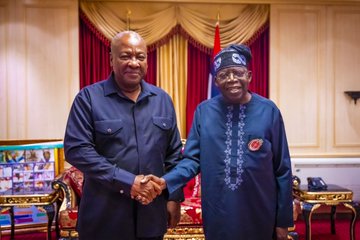Tinubu Hosts Ghana’s President-Elect John Mahama at Aso Rock
President Bola Ahmed Tinubu on Monday received Ghana’s President-elect, John Dramani Mahama, at the Aso Rock Presidential Villa in Abuja, marking the first high-profile international courtesy visit since Mahama’s recent electoral victory.
The meeting was disclosed on Tuesday by Tinubu’s Senior Special Assistant on Social Media, Dada Olusegun. In a statement, Olusegun wrote, “The President-Elect of Ghana, H.E John Dramani Mahama paid a courtesy visit to President Tinubu at his residence, Presidential Villa, State House Yesterday.”
Mahama’s visit follows his historic win in Ghana’s 2024 presidential election, where he emerged victorious under the National Democratic Congress (NDC). The announcement, made last week by the Electoral Commission of Ghana (ECG) through its chairman, Jane Mensa, officially confirmed Mahama’s return to the presidency after defeating his opponents in a keenly contested election.
During the meeting, sources revealed that both leaders discussed matters of mutual interest, including strengthening bilateral ties between Nigeria and Ghana, trade partnerships, and regional security. Tinubu reportedly congratulated Mahama on his electoral success, reaffirming Nigeria’s commitment to fostering collaboration between the two West African nations.
Mahama’s victory marks his second tenure as Ghana’s president, having previously served from 2012 to 2017. His return to office signals a renewed chapter for Ghana’s leadership under the banner of the NDC.
This high-level engagement underscores the importance of Nigeria-Ghana relations in fostering regional stability and economic growth. Both nations are pivotal players in the Economic Community of West African States (ECOWAS), and this meeting is expected to lay the groundwork for enhanced cooperation during Mahama’s upcoming presidency.
As the international community extends congratulations to Mahama, his visit to Nigeria underscores the enduring friendship between the two nations and highlights the role of diplomatic dialogue in shaping Africa’s future.














Post Comment